初中英语语法知识—介词的全集汇编(4)
- 格式:doc
- 大小:42.50 KB
- 文档页数:8
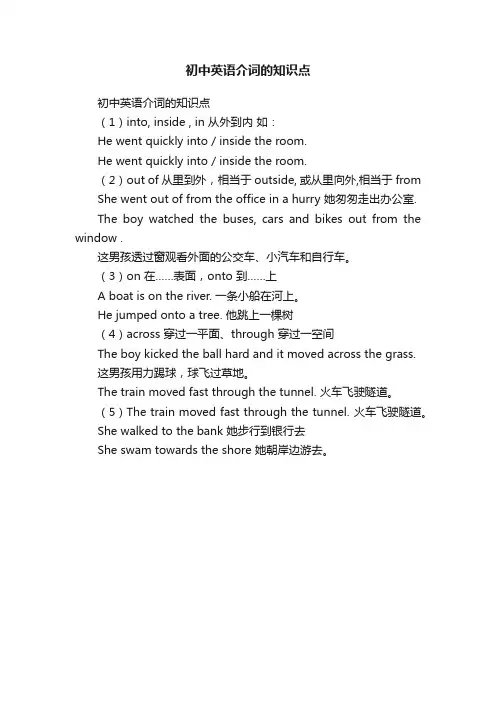
初中英语介词的知识点
初中英语介词的知识点
(1)into, inside , in 从外到内如:
He went quickly into / inside the room.
He went quickly into / inside the room.
(2)out of 从里到外,相当于outside, 或从里向外,相当于from She went out of from the office in a hurry 她匆匆走出办公室.
The boy watched the buses, cars and bikes out from the window .
这男孩透过窗观看外面的公交车、小汽车和自行车。
(3)on 在……表面,onto 到……上
A boat is on the river. 一条小船在河上。
He jumped onto a tree. 他跳上一棵树
(4)across 穿过一平面、through 穿过一空间
The boy kicked the ball hard and it moved across the grass.
这男孩用力踢球,球飞过草地。
The train moved fast through the tunnel. 火车飞驶隧道。
(5)The train moved fast through the tunnel. 火车飞驶隧道。
She walked to the bank 她步行到银行去
She swam towards the shore 她朝岸边游去。
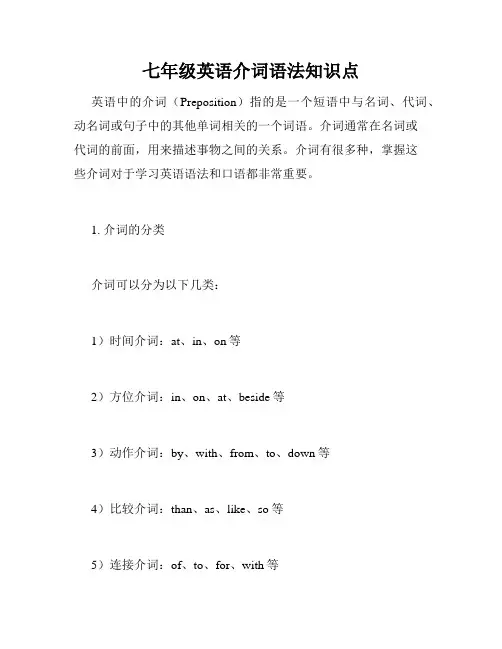
七年级英语介词语法知识点英语中的介词(Preposition)指的是一个短语中与名词、代词、动名词或句子中的其他单词相关的一个词语。
介词通常在名词或代词的前面,用来描述事物之间的关系。
介词有很多种,掌握这些介词对于学习英语语法和口语都非常重要。
1. 介词的分类介词可以分为以下几类:1)时间介词:at、in、on等2)方位介词:in、on、at、beside等3)动作介词:by、with、from、to、down等4)比较介词:than、as、like、so等5)连接介词:of、to、for、with等6)虚拟介词:but、except、save等2. 介词的用法(1)时间介词1)at:用于具体时间点。
如at six o'clock、at night等。
2)in:用于时间段、月份、季节、年份等。
如in the morning、in January等。
3)on:用于特定日期、星期几、节日、具体部分的某一天等。
如on Monday、on Christmas Day等。
(2)方位介词1)in:用于封闭的区域、城市、国家等。
如in the room、in Beijing等。
2)on:用于表面、垂直于表面的东西、街道、公路等。
如on the table、on the wall等。
3)at:用于具体点、建筑物、特殊地名等。
如at the door、at the park等。
4)beside:在……旁边。
如beside the river。
(3)动作介词1)by:靠、在……旁边;用(交通工具)。
如by the river、by bus等。
2)with:和、带着。
如with my friends、with a book等。
3)from:从……来、从……出发。
如from China、from home等。
4)to:向、到达的地方。
如to Beijing、to school等。
5)down:顺着某个方向(向下、向南、向河边等)。
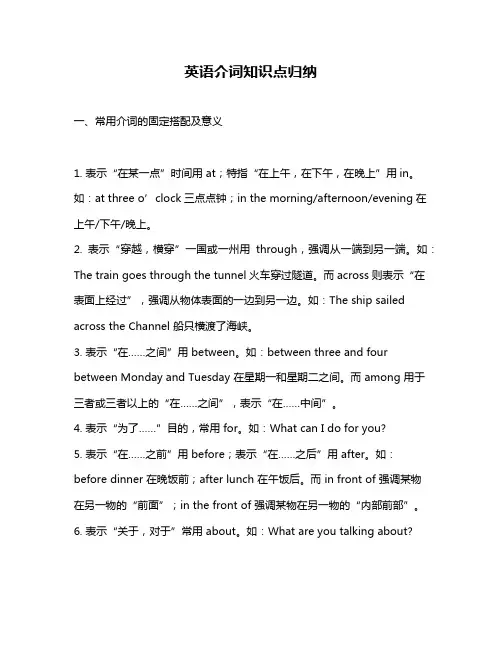
英语介词知识点归纳一、常用介词的固定搭配及意义1. 表示“在某一点”时间用 at;特指“在上午,在下午,在晚上”用in。
如:at three o’clock三点点钟;in the morning/afternoon/evening在上午/下午/晚上。
2. 表示“穿越,横穿”一国或一州用through,强调从一端到另一端。
如:The train goes through the tunnel火车穿过隧道。
而across则表示“在表面上经过”,强调从物体表面的一边到另一边。
如:The ship sailed across the Channel 船只横渡了海峡。
3. 表示“在……之间”用 between。
如:between three and four between Monday and Tuesday 在星期一和星期二之间。
而 among 用于三者或三者以上的“在……之间”,表示“在……中间”。
4. 表示“为了……”目的,常用 for。
如:What can I do for you?5. 表示“在……之前”用 before;表示“在……之后”用 after。
如:before dinner 在晚饭前;after lunch 在午饭后。
而 in front of 强调某物在另一物的“前面”;in the front of 强调某物在另一物的“内部前部”。
6. 表示“关于,对于”常用 about。
如:What are you talking about?7. 表示“除了……之外”用 except 或 besides。
如:All are here except Tom./ Besides you, I also know the answer.8. 表示“一个接一个,连续地”用 in turn。
如:They took the presents in turn.9. 表示“自……至……用from…to…” 如:from Monday to Friday 从星期一到星期五10. 表示“一方面的……另一方面……”常用 on one hand, on the other hand”。
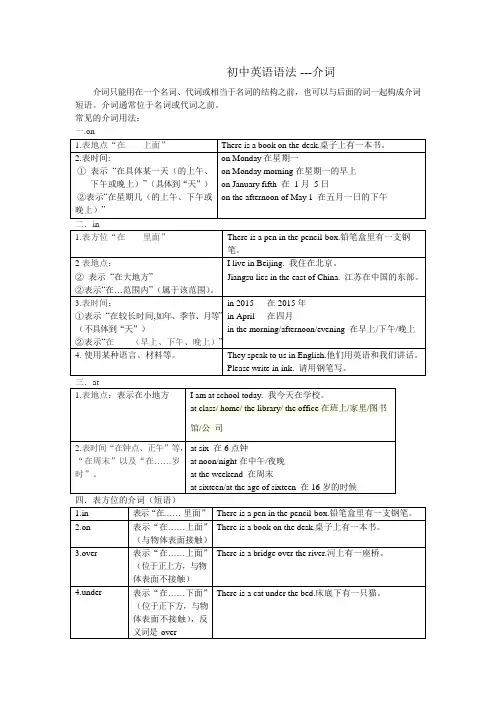
初中英语语法 --- 介词介词只能用在一个名词、代词或相当于名词的结构之前,也可以与后面的词一起构成介词短语。
介词通常位于名词或代词之前。
常见的介词用法:一.on五.其他常用介词练一练用适当的介词填空morning .2.Do the students stay home S a t u r d a y? 3.M y m o t h e r c u t t h e c a k ea knife4.We live a n e w h o u s e n o w.5.S h a n g h a i i sthe east of China.6.I usually have lunch noon.7.It’s eight o’clock.It’s time class.8.half past six , he usually has dinner.9.We have lessons eight o’clock twelve o’clock.11.There is a bridge the river.12.This is a photo my family.13.Tom comes England.14.My bed is the window.15.He looks his father.16.What's this English?17.The pen is the pencil-box.18.The bookstore is19.There are some pictures the right of our school.the wall.20.My telephone is the bed and the sofa.答案:1. at; in 2.at; on 3.with 4. in 5.in 6.at 7.for 8.At 9.from; to 10. with; by 11. over 12. of 13. from 14. near 15. like 16. in 17. in 18. on 19.on 20.between“”“”At the end, Xiao Bian gives you a passage. Minand once said, "people who learn to learn are very happy people.". In every wonderful life, learning is an eternal theme. As a professional clerical and teaching position, I understand the importance of continuous learning, "life is diligent, nothing can be gained", only continuous learning can achieve better self. Only by constantly learning and mastering the latest relevant knowledge, can employees from all walks of life keep up with the pace of enterprise development and innovate to meet the needs of the market. This document is also edited by my studio professionals, there may be errors in the document, if there are errors, please correct, thank you!。
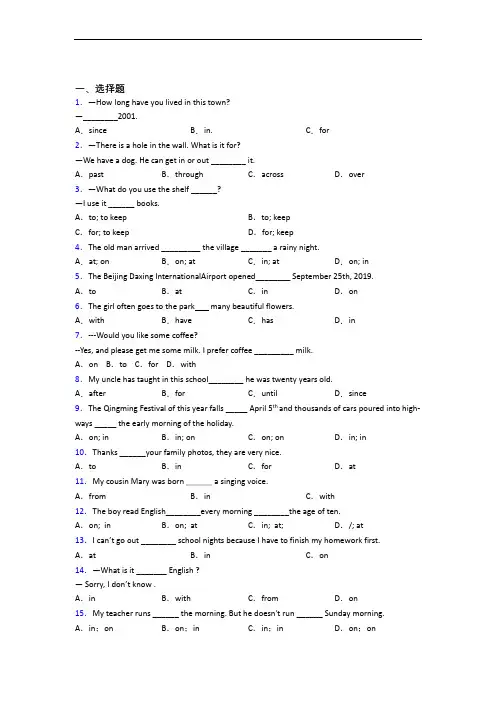
一、选择题1.—How long have you lived in this town?—________2001.A.since B.in. C.for2.—There is a hole in the wall. What is it for?—We have a dog. He can get in or out ________ it.A.past B.through C.across D.over3.—What do you use the shelf ______?—I use it ______ books.A.to; to keep B.to; keepC.for; to keep D.for; keep4.The old man arrived _________ the village _______ a rainy night.A.at; on B.on; at C.in; at D.on; in5.The Beijing Daxing InternationalAirport opened________ September 25th, 2019.A.to B.at C.in D.on6.The girl often goes to the park many beautiful flowers.A.with B.have C.has D.in7.---Would you like some coffee?--Yes, and please get me some milk. I prefer coffee _________ milk.A.on B.to C.for D.with8.My uncle has taught in this school________ he was twenty years old.A.after B.for C.until D.since9.The Qingming Festival of this year falls _____ April 5th and thousands of cars poured into high-ways _____ the early morning of the holiday.A.on; in B.in; on C.on; on D.in; in 10.Thanks ______your family photos, they are very nice.A.to B.in C.for D.at11.My cousin Mary was born ___ a singing voice.A.from B.in C.with12.The boy read English________every morning ________the age of ten.A.on; in B.on; at C.in; at; D./; at13.I can’t go out ________ school nights because I have to finish my homework first.A.at B.in C.on14.—What is it _______ English ?—Sorry, I don’t know .A.in B.with C.from D.on15.My teacher runs ______ the morning. But he doesn't run ______ Sunday morning. A.in;on B.on;in C.in;in D.on;on16.—What is Linda doing?—She is talking ________ the phone with her friend ________ a movie.A.in; for B.on; on C.about; on D.on; about 17.The accident took place ________ a cold February evening.A.on B.in C.at D.for18.It’s very kind ___________ you to lend me your reusable shopping bags.A.of B.for C.to D.with19.If success is a gate, the road this gate must be made up of difficulties.A.towards B.against C.opposite D.beyond 20.—What's the weather _______ in Spring?—Pardon?(什么,请再说一遍)—How is the weather________in Spring?A.like;/ B./;like C.be like;/ D./;be like 21.—It's wonderful, isn't it?— Yes, The large grassland, reaching out far away, looks very beautiful________the blue and clean sky.A.against B.above C.through D.past 22.—Where is Hubei?—It’s _______ the north of Hunan.A.in B.to C.on23.We started out in early spring and headed west the northern part of Asia. A.through B.between C.among D.across24.I want to learn English well beca use I don’t want to talk with foreigners ________ anybody else.A.by B.through C.across D.at25.We have four lessons ________ the morning.A.in B.on C.at D.for【参考答案】***试卷处理标记,请不要删除一、选择题1.A解析:A【解析】【分析】【详解】句意:——你在这个镇上住了多久了?——自2001年以来。
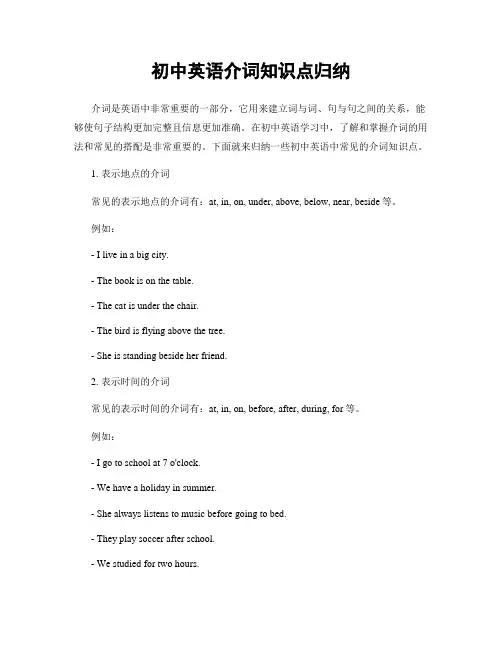
初中英语介词知识点归纳介词是英语中非常重要的一部分,它用来建立词与词、句与句之间的关系,能够使句子结构更加完整且信息更加准确。
在初中英语学习中,了解和掌握介词的用法和常见的搭配是非常重要的。
下面就来归纳一些初中英语中常见的介词知识点。
1. 表示地点的介词常见的表示地点的介词有:at, in, on, under, above, below, near, beside等。
例如:- I live in a big city.- The book is on the table.- The cat is under the chair.- The bird is flying above the tree.- She is standing beside her friend.2. 表示时间的介词常见的表示时间的介词有:at, in, on, before, after, during, for等。
例如:- I go to school at 7 o'clock.- We have a holiday in summer.- She always listens to music before going to bed.- They play soccer after school.- We studied for two hours.3. 表示原因的介词常见的表示原因的介词有:because of, due to, thanks to等。
例如:- He couldn't come because of the bad weather.- The match was canceled due to the heavy rain.- Thanks to your help, I finished my homework.4. 表示目的的介词常见的表示目的的介词有:for, to等。
例如:- He bought a gift for his mother.- She went to the supermarket to buy some food.5. 表示方式的介词常见的表示方式的介词有:by, with等。
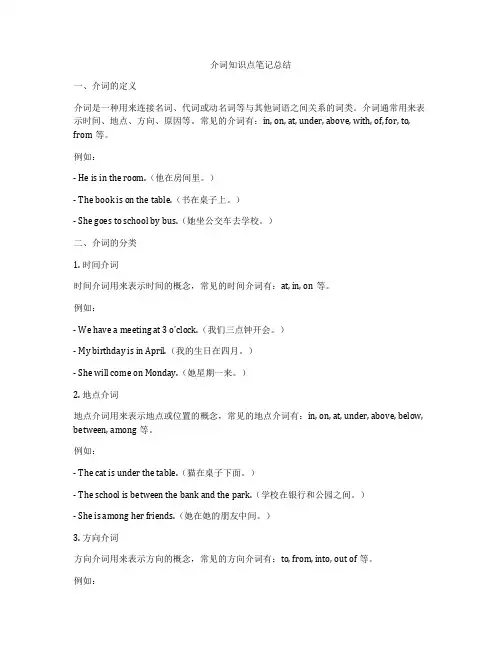
介词知识点笔记总结一、介词的定义介词是一种用来连接名词、代词或动名词等与其他词语之间关系的词类。
介词通常用来表示时间、地点、方向、原因等。
常见的介词有:in, on, at, under, above, with, of, for, to, from等。
例如:- He is in the room.(他在房间里。
)- The book is on the table.(书在桌子上。
)- She goes to school by bus.(她坐公交车去学校。
)二、介词的分类1. 时间介词时间介词用来表示时间的概念,常见的时间介词有:at, in, on等。
例如:- We have a meeting at 3 o’clock.(我们三点钟开会。
)- My birthday is in April.(我的生日在四月。
)- She will come on Monday.(她星期一来。
)2. 地点介词地点介词用来表示地点或位置的概念,常见的地点介词有:in, on, at, under, above, below, between, among等。
例如:- The cat is under the table.(猫在桌子下面。
)- The school is between the bank and the park.(学校在银行和公园之间。
)- She is among her friends.(她在她的朋友中间。
)3. 方向介词方向介词用来表示方向的概念,常见的方向介词有:to, from, into, out of等。
例如:- She goes to school by bike.(她骑自行车去学校。
)- He comes from China.(他来自中国。
)- The cat jumps into the box.(猫跳进箱子里。
)4. 原因介词原因介词用来表示原因或目的的概念,常见的原因介词有:for, because of, due to等。
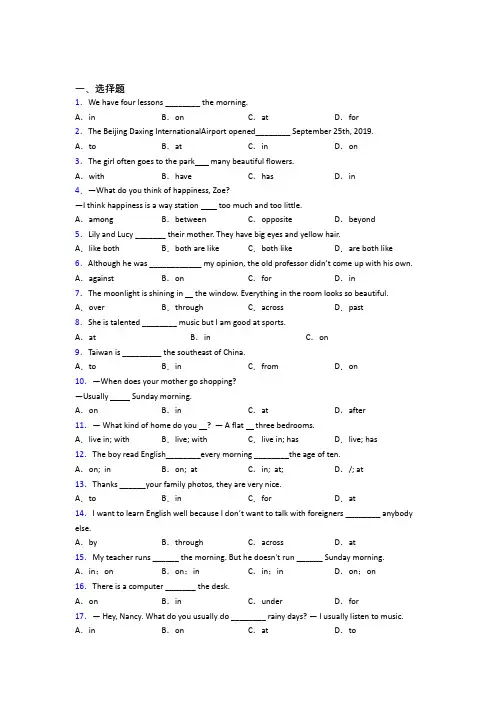
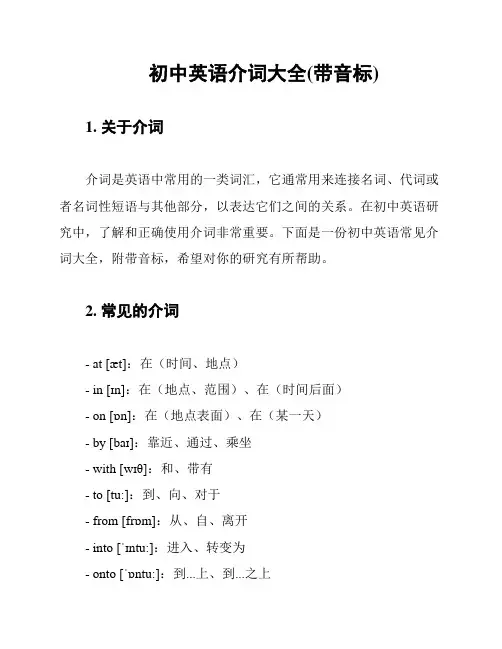
初中英语介词大全(带音标)1. 关于介词介词是英语中常用的一类词汇,它通常用来连接名词、代词或者名词性短语与其他部分,以表达它们之间的关系。
在初中英语研究中,了解和正确使用介词非常重要。
下面是一份初中英语常见介词大全,附带音标,希望对你的研究有所帮助。
2. 常见的介词- at [æt]:在(时间、地点)- in [ɪn]:在(地点、范围)、在(时间后面)- on [ɒn]:在(地点表面)、在(某一天)- by [baɪ]:靠近、通过、乘坐- with [wɪθ]:和、带有- to [tu:]:到、向、对于- from [frɒm]:从、自、离开- into [ˈɪntu:]:进入、转变为- onto [ˈɒntu:]:到...上、到...之上- out of [aʊt ʌv]:从...出来- for [fɔːr]:为、对于- about [əˈbaʊt]:关于、大约- with [wɪð]:用、带、跟- without [wɪˈðaʊt]:没有、无- of [ʌv]:的、属于- by [baɪ]:通过、靠- between [bɪˈtwiːn]:在...之间- among [əˈmʌŋ]:在...之中- near [nɪər]:靠近- beside [bɪˈsaɪd]:在旁边- under [ˈʌndər]:在...下面- over [ˈəʊvər]:在...上方- above [əˈbʌv]:在...之上- below [bɪˈləʊ]:在...之下- through [θruː]:穿过、通过3. 注意事项- 介词与其后的名词、代词有固定搭配,需要进行记忆。
- 不同介词有不同的使用场景和意义,需要根据具体语境进行选择。
以上是初中英语介词大全,带有音标,并附有简要说明。
在研究中,要多加练和熟练掌握这些介词的正确用法,以提升语言运用能力。
希望这份文档对你的研究有所帮助!参考资料:。
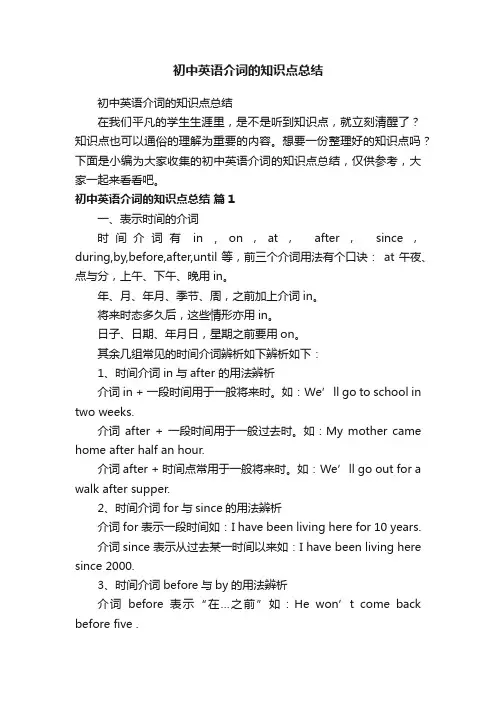
初中英语介词的知识点总结初中英语介词的知识点总结在我们平凡的学生生涯里,是不是听到知识点,就立刻清醒了?知识点也可以通俗的理解为重要的内容。
想要一份整理好的知识点吗?下面是小编为大家收集的初中英语介词的知识点总结,仅供参考,大家一起来看看吧。
初中英语介词的知识点总结篇1一、表示时间的介词时间介词有in , on,at,after,since,during,by,before,after,until等,前三个介词用法有个口诀:at午夜、点与分,上午、下午、晚用in。
年、月、年月、季节、周,之前加上介词in。
将来时态多久后,这些情形亦用in。
日子、日期、年月日,星期之前要用on。
其余几组常见的时间介词辨析如下辨析如下:1、时间介词in与after 的用法辨析介词 in + 一段时间用于一般将来时。
如:We’ll go to school in two weeks.介词after + 一段时间用于一般过去时。
如:My mother came home after half an hour.介词after + 时间点常用于一般将来时。
如:We’ll go out for a walk after supper.2、时间介词for与since的用法辨析介词for 表示一段时间如:I have been living here for 10 years.介词since 表示从过去某一时间以来如:I have been living here since 2000.3、时间介词before与by的用法辨析介词before表示“在…之前”如:He won’t come back before five .介词by表示“到…时为止,不迟于…”如:The work must be finished by Friday.4、时间介词during与for的用法辨析当所指的时间起止分明时用介词during如:He swims every day during the summer.如果一段时间不明确则用介词for如:I haven’t seen her for years.5、时间介词till与until用法的异同till和until用在肯定句中,均可表示“直到…为止”,如:I will wait till(until)seven o'clock.till和until用在否定句中,均可表示“在…以前”或“直到…才”。
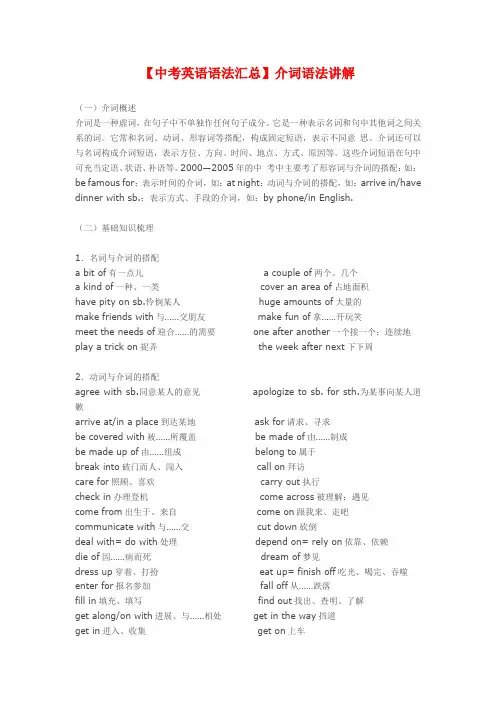
【中考英语语法汇总】介词语法讲解(一)介词概述介词是一种虚词,在句子中不单独作任何句子成分。
它是一种表示名词和句中其他词之间关系的词。
它常和名词、动词、形容词等搭配,构成固定短语,表示不同意思。
介词还可以与名词构成介词短语,表示方位、方向、时间、地点、方式、原因等。
这些介词短语在句中可充当定语、状语、补语等。
2000—2005年的中考中主要考了形容词与介词的搭配:如:be famous for;表示时间的介词,如:at night;动词与介词的搭配,如:arrive in/have dinner with sb.;表示方式、手段的介词,如:by phone/in English.(二)基础知识梳理1.名词与介词的搭配a bit of有一点儿 a couple of两个、几个a kind of一种、一类 cover an area of占地面积have pity on sb.怜悯某人huge amounts of大量的make friends with与……交朋友 make fun of拿……开玩笑meet the needs of迎合……的需要 one after another一个接一个;连续地play a trick on捉弄 the week after next下下周2.动词与介词的搭配agree with sb.同意某人的意见 apologize to sb. for sth.为某事向某人道歉arrive at/in a place到达某地 ask for请求、寻求be covered with被……所覆盖 be made of由……制成be made up of由……组成 belong to属于break into破门而人、闯入 call on拜访care for照顾、喜欢 carry out执行check in办理登机 come across被理解;遇见come from出生于、来自 come on跟我来、走吧communicate with与……交cut down砍倒deal with= do with处理depend on= rely on依靠、依赖die of因……病而死dream of梦见dress up穿着、打扮 eat up= finish off吃光、喝完、吞噬enter for报名参加fall off从……跌落fill in填充、填写 find out找出、查明、了解get along/on with进展、与……相处 get in the way挡道get in进入、收集 get on上车get off下车 get rid of摆脱get ready for为….作准备 get to到达get tired of对……感到厌倦 go in for参加、从事于、酷爱,'^ go ahead先走、向前走;去吧 go for a swim去游泳go on a diet实行节食 go over复习go on with继续做某事 grow up长大、成长hand in上交 hear from收到……的来信hear of听说 help sb. with sth.帮助某人做某事hold on等等(别挂电话)hold up举起hurry off匆忙离开join.n参加、加入keep... from使……不做 keep in touch with与……保持联系keep off阻挡;不让接近 knock over撞倒、撞翻later on过来;后来 laugh at嘲笑learn.., from向……学习 leave for动身去let out放出 line up整队;排成行live on靠……为生look after照顾;照料look at看;观看 look for寻找look forward to期待着 look like看上去像;显得look out of从……朝外看look up查寻;抬头看make out辨认出make up one's mind下决心meet with遭遇 operate on sb.为……动手术pay for付……钱 pick out拾起play with玩弄point at指向;指着point out指出praise sb. for sth.为某事表扬某人prefer... to(比起……来)更喜欢 prepare for准备protect... from保护……免受 pull down推倒put off延期put on穿;戴上;上演put out伸出 put up举起;挂起run after追捕;追踪 run away逃跑search for搜寻;搜查see off为……送行sell out售完 set out/off for出发去……;起程去……set up建立;设立. shake hands with与……握手share with与……分享show off炫耀show sb around带某人参观 shut up住口speed up加快速度stop...from阻止……做take away拿走 take care of照料take charge of负责;管理;take hold of抓住take in吸入 take off脱掉(衣物等);起飞take out取出take part in参加take up开始从事 talk about谈到talk to/with与...谈话 tell... from区别;分辨think of想起;想到 think over仔细考虑throw away扔掉 tie up捆绑try on 试穿turn down(把音量)调低turn into变成 turn off关掉(电灯、电视、收音机等)turn on开,旋开(电灯、电视、收音机等) turn over翻车;翻阅;翻身turn out结果是;证明是 wake up醒来;叫醒wait for等待;等候 write down写下work out算出;制定出经典例题:1.The foreigners arrived __________Shanghai __________ night.A. at…atB. in…atC. in... inD. at... in2. Wushu is becoming more and more popular __________ westerners.A. amongB. betweenC. inD.within3. __________ the help of the teachers, we decorated. Ourclassroom__________lanterns, flowers and pictures yesterday.A. Under... withoutB. Under... amongC. With... withD.With...between4. The cakes __________ the shape of a round moon is called mooncakes.A. likeB. look likeC. asD. likes5.改错:The manager told his secretary that he would be back __________ three-thirty.A. inB. afterC. beforeD. at6. It was clever __________ the boy to work __________ the mathsproblems in less than ten minutes.A. for…outB. of... outC. for...onD. of... on7. My aunt Jane tried her best to reduce her weight ________ 6kg.A.about B.at C.to D.by8. In my opinion, I agree __________ you __________that.A. to… withB. with…toC. with.., withD. with.., on9. I am familiar__________ this school since I have worked here for morethan fifteen years.A. withB. toC. aboutD. of10. Would you please look __________ my baby girl __________ myabsence?A. after…duringB. for…duringC. after… inD. to...in11. Mexico is ________ the south of America.A. inB. toC. onD. of12. The boy ____ the bike is Jackie Hu from Britain.A. byB. onC. inD. with13. Smoking and drinking are not good _______ your health.A. forB. toC. ofD. at14. Can you see the cat hiding __________ the tree?A. onB. underC. overD. in15. The litter bin__________ the corner of the room is a present from mybrother.A. atB. onC. inD. among16. It's fun to see a large number of stars shining in the sky ________ aclear night.A. atB. inC. onD. of1. 【解析】答案是B。
介词介词是一种虚词,不能独立充当句子成分,需与动词、形容词和名词搭配,才能在句子中充当成分。
介词是用于名词或代词之前,表示词与词之间关系的词类,介词常与动词、形容词和名词搭配表示不同意义。
介词短语中介词后接名词、代词或可以替代名词的词(如:动名词v-ing).介词后的代词永远为宾格形式。
一、表示时间的介词(一)表示时间段的介词(1)in , afterin +时间段,表示从现在起往后推算一段时间after +时间段,表示过去某时间往后推算一段时间,如:He’ll come back in two days. 但点钟用after( after three o’clock)He left on July 2 and returned after three days.(2)in , during表示在一段特指的时间内,可用in 或duringThe work was done in / during the holidays.表示年份、月份、季节用in , 如:in 1999 ,in June , in winter(3)in last, for the past + 时间段, during表示在最近一段时间内,句中谓语动词常用现在完成时I have been in Shanghai in the last few years.(4)for 表示延续一段时间。
I’ll study in the U.S for two yearsI’ve waited for Bingo for half an hour.(二)表示某一时间的介词(1)at, onat 表示某一时刻,on 表示某一天或日期, 如:at 7:14, on Saturday morning on the night of May2一天内各段时间表达, 选用正确的介词,请比较:in the morningon a winter / snow / cold / morningat nighton the night of March 7thin the eveningon Friday evening(2)before, bybefore 表示某一时间之前,而by 表示到某一时间止,句中谓语动词多用完成时态。
初中阶段介词用法汇编※一、表示时间的介词:1、at、on、in“at时间点,有on必有天,in指月季年,也和色相连”就是说,有具体的时间点的时候用at,具体那一天用on,说到月份,季节,年份,就用in ;而且说谁穿了什么颜色的衣服的时候,也是用in XX(color)】at用于某一具体时刻或重大节日之前①在五点钟______②在中午________③在夜晚________④在圣诞节________⑤在午夜_________【答案】①at five o’clock ②at noon ③at night ④at Christmas ⑤at midnight(2)on用在具体某一天或某天的上午、下午、晚上之前①在国庆节_________②在周二晚上_________③在星期天_________【答案】①on National Day ②on Tuesday evening ③on Sunday(3)in用在周、日、季节或泛指的上午、下午、晚上前①在一周内_________②在五月_________③在夏季_________④在2009年_________⑤在下午_________ 【答案】①in a week ②in may ③in summer ④in 2009 ⑤in the afternoon归纳总结在初中阶段常见的固定短语in English用英语 in a minute一会儿、立刻 in a short while一会儿、不久in a hurry匆匆忙忙 in danger在危险中 in full全部地、详细地in a word一句话 in all总共 in every case不管怎样in the end最后 in spite of尽管 in person亲自in fact事实上 in good health身体健康的 in front of在……前面in some ways在某些方面 in common共同的 in public当众☆考题再现:---Who was the first man with A(h1n1) flu in mainland China know for sure?---________May 11,2009.A InB OnC ForD Since【答案】B 【解析】在具体的某一天用on2、before、afterbefore表示“在某时刻或某件事之前”,after用在时刻或某件事之后。
初中英语介词归纳介词在英语中起着非常重要的作用,它们表示名词、代词与其他词之间的关系。
对于初中生来说,掌握介词的用法是英语学习的重要一步。
本文将对初中英语中常见的介词进行归纳和解释,帮助学生更好地理解和运用介词。
一、表示位置的介词1.at:表示一个具体的点或位置。
例如:at home(在家),at school(在学校)。
2.in:表示在一个范围或区域之内。
例如:in the city(在城市里),in the classroom(在教室里)。
3.on:表示在某个物体的表面之上。
例如:on the table(在桌子上),on the wall(在墙上)。
二、表示时间的介词1.at:用于表示具体的时间点。
例如:at seven o’clock(在七点),at noon(在中午)。
2.on:用于表示具体的某一天或某一天的上午、下午、晚上。
例如:on Monday(在周一),on the morning of July 1st(在七月一日的上午)。
3.in:用于表示一段时间,如年、月、季节等。
例如:in 2023(在2023年),in spring(在春天)。
三、表示方式的介词1.by:表示通过某种方式或手段。
例如:by bus(乘公交车),by email(通过电子邮件)。
2.with:表示使用某种工具或伴随某种情况。
例如:write with a pen(用钢笔写),with pleasure(很高兴地)。
四、其他常用介词1.about:表示关于某个话题或大约的数量。
例如:talk about(谈论),about ten books(大约十本书)。
2.after:表示在某个时间或事件之后。
例如:after school(放学后),after dinner(晚饭后)。
3.before:表示在某个时间或事件之前。
例如:before breakfast(早餐前),before class(课前)。
4.under:表示在某个物体的下方。
七年级英语语法介词在七年级英语中,介词是一个重要的语法概念。
介词是一种虚词,用来表示人、物、事件等之间的关系或位置。
以下是七年级英语中常见的介词及其用法:1. at:表示在某个时间点或某个位置,例如:at 7 o'clock(在七点钟),at the school gate(在校门口)。
2. in:表示在某个范围或时间段内,例如:in the morning(在上午),in the 21st century(在二十一世纪)。
3. on:表示在某个物体或表面上,例如:on the table(在桌子上),on the ground(在地上)。
4. under:表示在某个物体之下,例如:under the table(在桌子下),under the tree(在树下)。
5. near:表示在某个位置或距离附近,例如:near the school(在学校附近),near the river(在河边)。
6. behind:表示在某个物体后面,例如:behind the door(在门后面),behind the tree(在树后面)。
7. in front of:表示在某个物体前面,例如:in front of the classroom(在教室前面),in front of the car(在汽车前面)。
8. next to:表示紧挨着某个物体,例如:next to the teacher's desk(紧挨着老师的桌子),next to the river(紧挨着河边)。
9. above:表示在某个物体上方,例如:above the clouds(在云朵上方),above the tree(在树上方)。
10. below:表示在某个物体下方,例如:below the ground(在地上方),below the surface(在水面下方)。
初中英语语法专题介词与常见短语介词(preposition 简写prep.),又称作前置词,表示名词、代词等与句中其它词的关系,在句中不能单独作句子成分。
我在这里整理了相关资料,快来学习学习吧!初中英语语法专题介词一、概念介词(preposition)表示与名词、代词等其它词的关系,不能单独做句子成分,介词后面的成分称为宾语。
二、分类介词可以用来表示时间、地点、方位、方式、手段等。
①重点词整理解析(at\in\on\by\before\after\until\for\since)at1. at+点钟at one oclock 在七点钟2. at+the+n s (shop) at the bakers (shop) 在面包店at the hairdressers (shop)在理发店3. at noon/night/midnight 在正午/夜晚/午夜4. at home/work/school/church 在家/上班/上学/做礼拜5. at breakfast/lunch/dinner 在吃早/午/晚饭6. arrive at+小地点arrive at the airport 到机场7. at+节日at Spring Festival 在春节期间8. call sb at+号码打...号码找某人9. email sb at+邮件地址发...电子邮件给某人10. call at +地点探望某个地方11. 其它固定搭配at the price/speed...of 以...的价格、速度in1. in+年、月in 20xx/May 在20xx年五月2. in+季节in Summer 在夏天3. in the morning/afternoon/evening 在早上/下午/晚上4. in+世纪in the twenty-first century 在21世纪5. in+颜色表示穿着the girl in red 穿红色衣服的女孩6. in+语言in English/Chinese 用英语/汉语7. in+声音in a weak voice 用微弱的声音8. in+时间段表示将来in five minutes 五分钟以后(划线提问用how soon)9. in+地点(大地点) in Qingdao 在青岛10. in+物体在...里面in the glass 在杯子里11. in+方向in the west 在西边12. 其它in front of 在...前面in the end 最终in the past few years 在过去的几年里on1. on+详细日期/礼拜on May 8th 在五月八日on Wednesday 在周三2. on+ 节日(带Day 的节日) on Mothers Day 母亲节3. on+地点on the table(在桌子上) on the train(在火车上)4. call on+sb call on your friend 探望你的挚友5. 表示方位(毗邻、接壤) Russia is on the north of China. 俄罗斯与中国北部相连。
介词超全的英语介词用法归纳总结~优秀6篇介词,表示名词、代词等与句中其他词的关系,在句中不能单独作句子成分。
下面是作者给大家整理的6篇超全的英语介词用法归纳总结~,希望可以启发您对于介词的写作思路。
at 表示“以……速度”“以……价格”。
篇一It flies at about 900 kilometers an hour. 它以每小时900公里的速度飞行。
I sold my car at a high price. 我以高价出售了我的汽车。
英语介词知识总结归纳篇二介词又叫前置词,是一种虚词。
常用于名词词组和其他与之相当的结构之前,表示类似成分的关系。
1.介词构成(1)简单介词是南一个单词构成的介词,可分为3类:①普通介词:如at,by,for,from,in,of,on,to,with等,这里列举的9个介词是英语中较常用的简单介词,它们约占介词使用率的92%;②合成介词:如onto,within等;③分词介词:如including等。
(2)二重介词是由两个简单介词连用而构成。
如from?behind,until?after等。
(3)短语介词是由两个或两个以上的。
词所组成的短语构成的介词。
一般说来,这个短语的较后一个词是简单介词。
如in front of,because of等。
2.几个常用介词的区别(1)at,in,on和by表示时间的区别在于:at表示时间的单位较小,通常表示时间的某一点、某一时刻等。
如:at four o’clock.也可指某个节日或一年中发生大事的日子。
如:Her grandfather died at seventy-two.in表示某个较长的时间(如世纪、朝代、年、月、季节,以及泛指的上午、下午和傍晚等)内。
如:He was born in 2002.on表示具体的时日和一个特定的时间,如:某节日、星期几以及在某个特定的早晨、下午或晚上,也可表示“准(时),按(时)”等。
一、选择题1.He often has lunch ______ about twelve o'clock.A.in B.at C.on D.with2.The old man arrived _________ the village _______ a rainy night.A.at; on B.on; at C.in; at D.on; in 3.North Korea is________Asia. It’s________the northeast of China and________the west of Japan.A.in, to, on B.in, on, to C.on, in, to D.to, on, in 4.—Do you know the girl ________ red skirts?—Yes, she is my sister.A.at B.on C.in D.to5.The girl often goes to the park many beautiful flowers.A.with B.have C.has D.in6.O ur school plans to have a parents’ meeting_______ the afternoon_______ January 27th. A.in; of B.on; in C.on; of D.in; at 7.—Mary's birthday is ________ March. What about Lucy's?—Her birthday is ________ December 10th.A.in;on B.on;in C.on;on8.—What's the secret good health?—Eating healthy food and taking enough exercise.A.in B.to C.on9.Thanks ______your family photos, they are very nice.A.to B.in C.for D.at10.My cousin Mary was born ___ a singing voice.A.from B.in C.with11.My best friend is now________China, so I want to go________China, too.A.in;on B.on;to C.of;for D.in;to12.—I feel sad from time to time.Could you give me some advice?—________ sharing your worries with your parents?A.Why don't you B.How aboutC.Why not D.Would you like13.My teacher runs ______ the morning. But he doesn't run ______ Sunday morning. A.in;on B.on;in C.in;in D.on;on 14.The next Olympic Games will be held in Japan________ 27th July 2020.A.on B.in C.at D.of15.— Hey, Nancy. What do you usually do ________ rainy days? — I usually listen to music. A.in B.on C.at D.to 16.(2017年山东德州)A woman stood ______ the window, watching the children playinggames in the garden.A.past B.through C.across D.by17.My daughter usually gets up at 6:00 ________ the morning, but ________ Sunday morning she gets up at 8:00.A.in; in B.in; on C.on; in D.on; on18.---Do you prefer coffee _____milk in it?---Sometimes, but most of the time I ______drink black coffee.A.or, would rather B.with, prefer C.with, would rather D.to, prefer 19.It’s very kind ___________ you to lend me your reusable shopping bags.A.of B.for C.to D.with20.My friend, Henry was born June 10th, 1997.A.in B.on C.at D.for21.If success is a gate, the road this gate must be made up of difficulties.A.towards B.against C.opposite D.beyond 22.They got married_______ 1960. That means they have been married _______ 1960. A.at; since B.on; in C.in; since D.for; since 23.Tom was born________London________May lst, 2001.A.in; in B.in; on C.on; on D.on; in24.We started out in early spring and headed west the northern part of Asia. A.through B.between C.among D.across25.–Emma can go out ________ school nights but she must be back ________ ten o’clock.--Oh, I see.A.on, before B.on, after C.in, before D.in, after【参考答案】***试卷处理标记,请不要删除一、选择题1.B解析:B【解析】【分析】【详解】句意:他经常在大约十二点吃午餐。
考查介词。
in表示年、月、季节或泛指上午、下午、晚上;at用于表示某一具体时刻或时间点;on指具体的某一天或某天的上午、下午、晚上;with表示“和,跟”。
根据“about twelve o'clock.”可知,这是具体的时刻,因此用介词at。
故选B。
2.A解析:A【解析】【详解】句意:那位老人在一个雨夜到达了那个村庄。
本题考查介词。
at在,on在……上面,in在……里。
arrive at表示到达小地点;arrive in表示到达大地点。
到达一个小村庄,用arrive at。
表示在一个下雨的夜晚,用介词on。
故选A。
3.B解析:B【解析】【详解】句意:朝鲜在亚洲。
它在中国的东北方,日本的西边。
本题考查介词。
be in表示某地的内部,be on表示两个地方相邻接壤,be to表示两地相邻中间相隔。
第一空表示朝鲜在亚洲的内部,用介词in。
第二空表示朝鲜与中国接壤,用介词on。
第三空表示朝鲜与日本相邻,中间隔着海,因此用介词to。
故选B。
4.C解析:C【解析】【分析】【详解】句意:——你知道穿红裙子的那个女孩吗?——是的,她是我的妹妹。
考查介词辨析。
at在……;on在……上;in穿,在……; to到……。
根据下文“Yes, she is my sister.”可知上文是“穿红裙子的那个女孩”,in red skirts表示“介词短语作后置定语”。
the girl in red skirts表示“穿红衣服的那个女孩”,根据题意,故选C。
5.A解析:A【解析】【分析】【详解】句意:这个女孩经常带着美丽的花去公园。
考查介词的用法。
with和,表示伴随;have有;has有;in在……里面。
根据句意可知女孩带着“美丽的花”,表示伴随,用with。
故选A。
6.C解析:C【解析】【分析】【详解】句意:我们学校计划在一月27日下午开家长会。
考查介词的用法。
在具体的一个下午要用介词on。
泛指在下午in the afternoon。
这一月二十七日的下午,所以是所属关系,用介词of。
故选C.7.A解析:A【解析】【分析】【详解】句意:--Mary的生日在三月,Lucy的呢?—他的生日在10月10日。
考察时间介词。
在月份前用介词in, 在具体日期前用介词on, 故选A。
【点睛】时间介词用法口诀:周月季年长时间in需放在其前面;at用于时刻前,也与正午午夜连;on用于具体某一天。
8.B解析:B【解析】【分析】【详解】句意:——保持身体健康的秘诀是什么?——吃健康的食物和多做锻炼。
考查介词。
in 接某年某月某季节;to向,朝着;on 接具体某一天。
根据句意,空格处表示"身体健康的秘诀",固定搭配the secret to ……的秘诀,所以空格处用介词to。
故选B。
9.C解析:C【解析】【分析】【详解】句意:谢谢你的家庭照片,它们非常漂亮。
考查介词辨析题。
thank不和in及at搭配,可排除BD两项。
thanks to幸亏,后接代词;thank for为……而感谢,后接名词或动名词。
根据句意语境,可知thanks to不合句意,故选C。
10.C解析:C【解析】【分析】【详解】句意:我的表妹玛丽天生具有唱歌的嗓子。
考查介词辨析。
from来自;in在……里面;with和;be born with…天生具有……。
据句意,故选C。
11.D解析:D【解析】【分析】【详解】句意:我最好的朋友现在在中国,所以我也想去中国。
考查介词和动词短语。
“在中国”使用介词in,go to sp.:去某个地方。
故选D。
12.B解析:B【解析】【详解】句意:——我时常感到悲伤。
你能给我一些建议吗?——把你的烦恼和你父母分享一下怎么样?考查固定句型。
Why don’t you=Why not后面加动词原形,表示建议,意思是“为什么不做……”,而答语sharing不是动词原形,故排除A/ C;Would you like后面加to do sth.意思是“想要做某事”,故排除D;How about后面加动词的doing形式,意思是“……怎么样”,故选B。